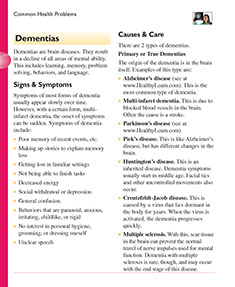Brain & Nervous System
Dementias
Dementias are brain diseases. They result in a decline of all areas of mental ability. This includes learning, memory, problem solving, behaviors, and language.
Signs & Symptoms
Symptoms of most forms of dementia usually appear slowly over time. However, with a certain form, multi- infarct dementia, the onset of symptoms can be sudden. Symptoms of dementia include:
• Poor memory of recent events, etc.
• Making up stories to explain memory loss
• Getting lost in familiar settings
• Not being able to finish tasks
• Decreased energy
• Social withdrawal or depression
• General confusion
• Behaviors that are paranoid, anxious, irritating, childlike, or rigid
• No interest in personal hygiene, grooming, or dressing oneself
• Unclear speech
Causes & Care
Primary or True Dementias
The origin of the dementia is in the brain itself. Examples of this type are:
• Alzheimer’s disease. This is the most common type of dementia.
• Multi-infarct dementia. This is due to blocked blood vessels in the brain. Often the cause is a stroke.
• Parkinson’s disease
• Pick’s disease. This is like Alzheimer’s disease, but has different changes in the brain.
• Huntington’s disease. This is an inherited disease. Dementia symptoms usually start in middle age. Facial tics and other uncontrolled movements also occur.
• Creutzfeldt-Jacob disease. This is caused by a virus that lies dormant in the body for years. When the virus is activated, the dementia progresses quickly.
• Multiple sclerosis. With this, scar tissue in the brain can prevent the normal travel of nerve impulses used for mental function. Dementia with multiple sclerosis is rare, though, and may occur with the end stage of this disease.
Secondary Dementias
• Depression
• Alcohol problems
• Reactions to certain medicines
• Poor nutrition. Lack of vitamin B12.
• Hypothyroidism
• Dehydration
• Head injuries
• Infections, such as HIV which causes AIDS or syphilis
• Brain tumors
{Note: A recent study found that older Veterans with posttraumatic stress disorder (PTSD) are nearly two times as likely to have dementia than their peers who do not have PTSD.}
Dementias need medical diagnosis and treatment. When another condition, such as depression, is the cause and is treated with success, the dementia can be cured. For others, such as Alzheimer’s disease, there is no cure. The goal of treatment is to treat symptoms and provide safety and comfort.
Self-Care
The person with dementia needs to:
• Follow a simple daily routine
• Limit activities
• Wear an ID tag
• Be kept in a safe environment
• Have labels put on objects
• Eat a well balanced diet and drink plenty of fluids
• Have regular sensory stimulation, like touching, exercising, etc.
Caretakers should:
• Assume a non-combative approach to difficult behaviors. Steer the person into another activity.
• Give medicines as advised by the person’s doctor and report and review medicines with the doctor and/or pharmacist.
• Get home care, respite care, hospital, or nursing home care, if needed.
When to Seek Medical Care
Contact Doctor When:
• You are unable to care for someone with dementia or he or she is too agitated or hostile to control.
• A medical evaluation is needed for a person with symptoms of dementia.
Get Immediate Care When:
Any of the “Stroke Warning Signs” are present.
Delirium
Delirium is mental confusion, behavior changes, etc. that develop in a matter of hours to a day or so. Delirium is a symptom of another condition, such as:
• A high fever
• Pneumonia or other infection
• Diabetes
• Substance abuse or withdrawal
• Misuse or withdrawal of certain medicines
Immediate medical care is needed for delirium so the cause can be found and treated.

Download an offline pdf file.
2021 © American Institute for Preventive Medicine - All Rights Reserved. Disclaimer | www.HealthyLife.com








